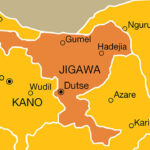
Experts and stakeholders under the auspices of the Forum on Farmer-Herdsmen Relations in Nigeria (FFARN) has said that over 62,000 people have been displaced in the middle belt due to protracted farmers and herdsmen crisis in Nigeria.
This is contained in a report of the experts sponsored by the Search For Common Ground (SFCG) titled ‘Response to Conflicts: Between Farmers and Herders in the Middle Belt of Nigeria: Mapping Past Efforts and Opportunities for Violence Prevention’.
The report co-authored by the SFCG’s Research Fellow, Dr. Chris Kwaja and the Conflict Analyst and project manager, Mrs. Bukola Ademola-Adelehin, was formally released yesterday in Abuja at the openings of a workshop on ‘Conflict System Analysis of Farmer-Herder’s Conflict and Policy Analysis’.
Dr Kwaja said that over 6000 people had also been killed especially in Benue, Kaduna, Nasarawa and Plateau states.
According to him climate variability, environmental degradation and socio-political upheaval had shifted pastoralist migratory patterns and increased tensions between the two groups.
“These changes have increased confrontations between farmers and herdsmen leading to violent, conflict, deaths, forced displacement and migration, erosion of inter-communal relationships as well as destruction of agricultural and livestock outputs. The increased competition for land and water resources further exacerbate everyday conflict, for instance when cattle destroy crops farmers react and vice versa. In Nigeria, the consequences have been severe, more than 6,000 people have been killed and 62,000 people have been displaced in the four states,” Kwaja said.
He suggested a review of state and non-responses to be the next step to serve as foundation for future initiatives to curb the crisis, and also urged the government to review the existing structure of cattle routes and reserves and review the current nomadic program.
Mrs Bukola Ademola-Adelehin who wondered why despite efforts to address the farmers and herdsmen crisis, challenges still remained adding that proliferation of arms and light weapon must be addressed
She said that farmers and herdsmen have had symbiotic and mutually beneficial relationship for long periods in Nigeria’s history.
She said that the current breakdown of social, economic and political relations between the groups had not gone too bad and that it could be reversed for common good
 Join Daily Trust WhatsApp Community For Quick Access To News and Happenings Around You.
Join Daily Trust WhatsApp Community For Quick Access To News and Happenings Around You.


